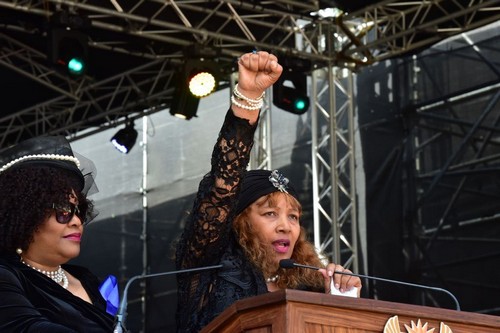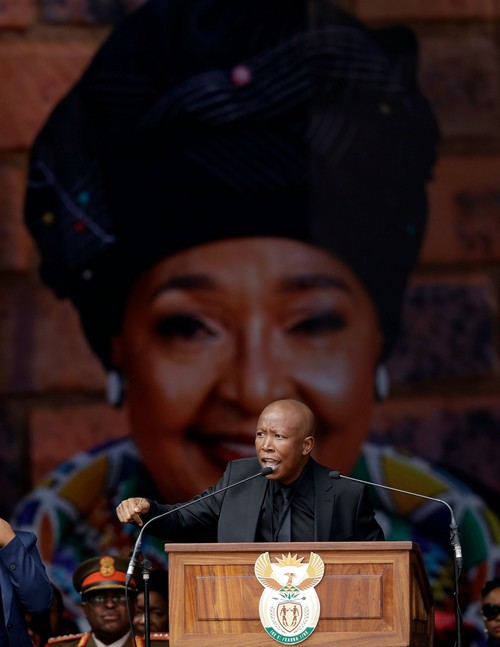“For those who have not had the time or the courage to go beyond the quick headlines or the rushed profiles, I urge you to search the archives so that you may fully appreciate who my mother really was, and why her life and story matters so much”, she told a packed football stadium in Soweto, not far from her Madikizela-Mandela lived.
Much like her mother would have at activists’ funerals during the apartheid era, Zenani Mandela-Dlamini allowed her righteous anger to lead her tribute at the state funeral for Winnie Madikizela-Mandela on Saturday April 14.
She lambasted the media for repeating lies of the apartheid propaganda machinery and called those who now defended her mother in death hypocrites.
“And to those who’ve vilified my mother through books, on social media and speeches, don’t for a minute think we’ve forgotten”, she said, flanked by her sister Zindziswa Mandela-Hlongwane. “The pain you inflicted on her lives on in us.”

As her mother would. (Government Communication Information System)
Echoing several commentators this week, Mandela-Dlamini said she believed that much of the criticism her mother faced was because she was a woman. It was the kind of “double-standard” that obscured the contribution of women in South Africa’s anti-apartheid struggle.
“Over the past week and a half it’s become clear that South Africa, and indeed the world, holds men and women to different standards of morality”, said Mandela-Dlamini. “Much of what my mother has been constantly asked to account for is simply ignored when it comes to her male counterparts.”
Her anger was echoed by Madikizela-Mandela’s adopted political son, Julius Malema. In his tribute he singled out the now disbanded United Democratic Front, who distanced itself from Madkizela-Mandela during her controversies in the 1990s and members of the ANC’s women’s league who called Madkizela-Mandela a criminal.

Grief and anger. (AP Photo/Themba Hadebe)
“Mama, some of those who sold you out to the regime are here. They are crying the loudest, more than us who died for you”, he said, also calling for Cape Town International Airport to be renamed for Madikizela-Mandela.
An occasion for political expression, many in the crowd wore the ANC’s green, gold and black but also the red of Malema’s breakaway party, Economic Freedom Fighters. Many women covered their heads as part of a continuation of the #IAmWinnie campaign.
Much of the national conversation around Madikizela-Mandela legacy has been driven by the documentary Winnie. Directed by Pascale Lamche, the film was released in 2017 and earned Lamche the directing award in the World Cinema Documentary category at the Sundance Film Festival in the year of its release. It didn’t garner much attention in South Africa until this week when it came to be viewed as the last time Madikizela-Mandela got to tell her side of the story.
It shocked South Africans to learn of the apartheid government’s sophisticated misinformation and propaganda operations, known as Stratcom. The film features an interview with one of its chief operatives who explains who they twisted facts, planted stories and paid journalists to target Madikizela-Mandela. Unable to neutralize her as the voice for Nelson Mandela while he was imprisoned, they sought to drive a wedge between them, chiefly through revealing her infidelities and humiliating both of them.
The film was aired on local television channels and in public screenings in part as a response to the unflattering coverage Madikizela-Mandela’s legacy received in the immediate aftermath of her death. The very channel that aired the documentary several times in the last few days was accused of unfairly focusing on the negative aspects of Madikizela-Mandela’s activism hours after her death.
The documentary, however, lacks balance because its ultimate aim is to clear Madikizela-Mandela’s name. It seems to have succeeded among many this week, by clearing the dark clouds that still hung over Madikizela-Mandela’s head. But it also recasts Madikizela-Mandela’s humanity, her achievements beyond her marriage, and courage to be the voice of a banned movement at a time when police did not shy away from using live ammunition on children. More importantly, the film reveals just how ugly the physical and psychological war of apartheid was and what it took from those who stood against it.


